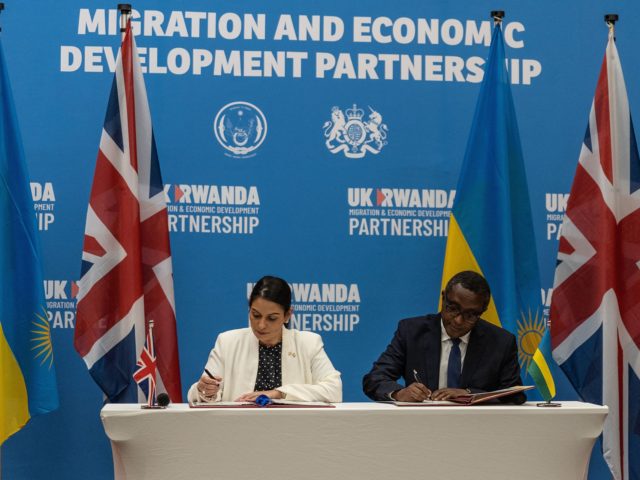Lawyers for activist “charities” and trade unions have successfully halted the first planned transfer of migrants from Britain to Rwanda, in a move which has surprised no one — including the government.
The Priti Patel-led Home Office, which is the government department with broad responsibility for national security, policing, and border immigration control in the United Kingdom, has agreed to halt flights until after June 6th after activists sent “pre-action” letters confirming they would try to overturn the transfer policy in the courts.
The policy, similar to Australia’s Operation Sovereign Borders, would see some migrants who enter the United Kingdom after passing through other safe countries, including by boat, transferred to Rwanda to be looked after at Britain’s expense, has drawn considerable ire from the leftist politicians and activists and mainstream media outlets.
“Sending [migrants] to Rwanda would breach their rights, cost taxpayers millions and break international law. We’re fighting it, and we believe the public will support us,” claimed Clare Moseley, the controversial founder of Care4Calais, one of the so-called charities bringing legal action against the policy, in comments quoted by The Telegraph.
Care4Calais is being joined by the Public and Commercial Services (PCS) union and Detention Action, another “charity” that opposes detaining migrants whose identities and backgrounds are not fully known, seemingly despite the obvious public safety risks when they are left at large.
Members of the public may be surprised about the participation of the PCS in the group, given it represents Border Force personnel who are supposed to be stopping illegal migrants — but it will be no surprise to immigration watchers in Britain, who are aware of the fact that the agency’s commanders are not particularly enthusiastic about border enforcement.
Despite the setback, the Conservative Party government is claiming the halt is not “a win” for anti-borders on the dubious grounds that the policy is expected to be held up by the courts.
“They have claimed a win when there isn’t one,” a spokesman for the government claimed, despite the fact that the activists have clearly prevented removals from taking place for the time being.
“We never said when we would send the first flight,” the spokesman added — as if the public might not have been expecting it to depart in a timely fashion, given Channel crossings were first declared a “major incident” by the government in 2018 and have only gotten exponentially worse ever since.
Indeed, an official report by David Bolt, then Britain’s Independent Chief Inspector of Borders and Immigration, admonished the government in 2020 for not taking “decisive action” on the crisis in 2018, ruling that, if they had done so, “the small boats route may not have become established in the minds of many migrants and facilitators as an effective method of illegal entry.”
Of course, the Home Office has also been continuing to fail to tackle the so-called clandestine entries by sometimes violent migrants who are smuggled in, stow away on, or break into lorries and other vehicles crossing the Channel — an issue which now gets little press coverage with the rise of the ever-worsening boat crisis but has not gone away — and on the comparatively prosaic but far more significant issue of visa overstaying, which sees an estimated 64,000 migrants illegitimately reside in Britain every year.

COMMENTS
Please let us know if you're having issues with commenting.